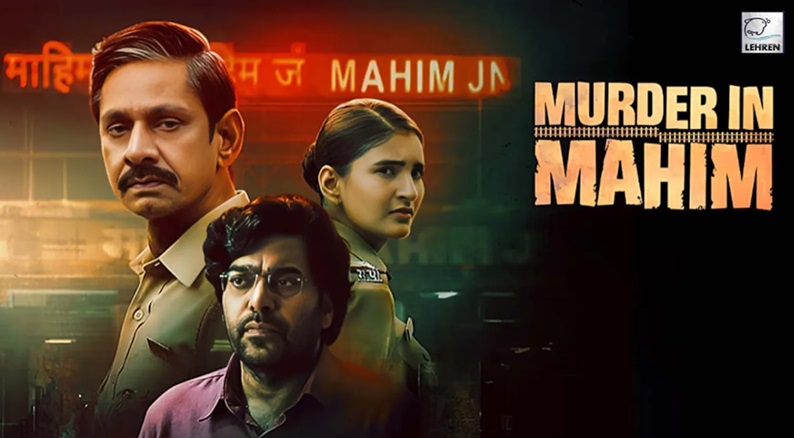Murder in Mahim Review: JioCinema Original Explores Homophobia Through Crime Drama
The show is set in Mumbai in 2013, a time when Article 377 of the Constitution was still in force and homosexuality was a criminal offence.
Based on Jerry Pinto’s novel of the same name, GeoCinema’s new original series, Murder at Maahim, is a crime thriller that revolves around the brutal murder of a gay prostitute in a public toilet at Mumbai’s Maahim station. Starring popular characters Vijay Raaz and Ashutosh Rana, the series blends a traditional crime thriller narrative with social commentary, placing their performances at the heart of the unfolding investigation.
Over the course of eight episodes, a police inspector played by Raaz and a former journalist (now estranged friend) played by Rana each try to solve this gruesome case in their own way. Their investigation takes us to gay clubs, queer parties, gatherings and, by night, the forbidden back alleys of Mumbai, where the bleak and terrifying world of gay prostitution unfolds. The series delves deep into the lives of sex workers, portraying their plight and tenacity in stark detail.
While “Murder in Mahim” may seem a bit forced and predictable at the outset, with its mundane plot, familiar loopholes and heavy-handed social commentary, it soon develops into a must-see piece of art with strong performances. If you are patient enough with the series, at least until the third episode, you will enjoy the pleasure of a film that tackles complex themes with ease.
Shivaji Satam in a still from ‘Murder in Mahim’
The show exposes the many layers of homophobia and abuse, from nasty name-calling and bigoted cruelty to honey-trap crimes where threatened queer people have nowhere to turn for help, including the police. Murder in Mahim explores the impact of homophobia across social classes. From penniless queers being forced into prostitution to people in positions of power fearing people from coming out, the series takes a broad look at the concerns of the LGBTQ community. The portrayal of queer life is also done in a natural tone and doesn’t feel forced, overly dramatic or pompous.
In one scene, two lesbian lovers in a room panic when their parents, who are not yet aware of their sexual orientation, arrive unexpectedly. The reactions of all the characters are thankfully understated and innocent, normalizing queer life.
But Murder in Mahim does try to play it safe in a few scenes, especially when Peter Fernandes (played by Rana) and his wife are worried that their son might be gay. With no idea what the “cure” for this “symptom” is, the couple at some points give the impression of being textbooks of what’s wrong with parents of a queer child, only to later grow up thinking this is what an ideal parent should be like.
But the show is not just about homosexuality. Murder in Mahim also deftly tackles the conflicts and complexities of father-son relationships. What a beautiful portrayal. It is very rare for the Indian film and television industry to take up this theme and do it justice. Be it the estranged relationship between Siva, played by Vijay Raaz, and his difficult father, played by Sivaji Satam (best known for playing ACP Pradyuman in the CID), or the gradually estranged relationship between Siva and his teenage son , the show handles relationships with tenderness. Many scenes in the latter half of the show brought a smile to my face, some of which reminded me of the hilarious relationship between the dour father played by Amitabh Bachchan and his headstrong daughter played by Deepika Padukone in Piku.
One scene that will probably stay with me for a long time is when a young police officer finds pornographic magazines in his teenage son. One would expect a reprimand to follow, but the comical character wisely handles the situation without sending his son into the depths of guilt and shame. It is a simple yet powerful scene that depicts an unspeakable tenderness between father and son.
Vijay Raaz and Shivani Raghuvanshi in stills from ‘Murder in Mahim’
“Murder in Mahim” also takes a satirical stance against the sensationalist media and indifferent police authorities, who conveniently distort facts, chew over “great news stories” and “official statements” without reliable sources, and add fuel to the already burning flames of homophobia. In one scene, the media accuses an old man of being a pedophile and homophobic monster on weak evidence. As the media interrogations pile up, the characters helplessly stare at angry protesters outside their house. This fictional scene is not far from the truth and highlights several similar real-life cases where reporters conveniently ignored ethics for the sake of clicks and views.
Though Murder in Mahim has many tense scenes capturing the nuances of human psychology and emotions, the makers have struck a perfect balance by frequently including comedy elements to ease the tension. This is often necessary for films and shows with tough social messages to appeal to a mass audience who would otherwise not be willing or even able to watch select critically acclaimed films. The makers have made a decent attempt at conveying a complex and important issue in an easy to understand and accessible manner without sacrificing the complexity of the subject at hand.
“Murder in Mahim” starts off a bit dull in the first few episodes, but slowly but surely the series shines thanks to a compelling storyline, strong acting and stunning cinematography.

